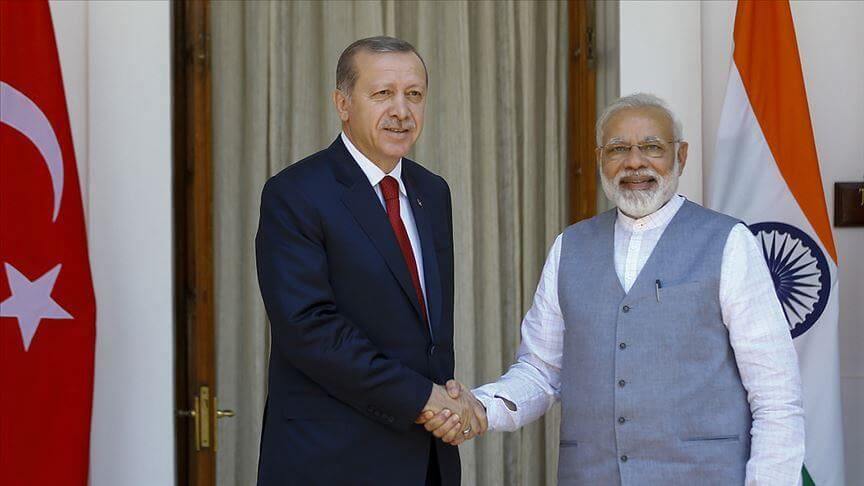In what seems like a featured press release from an anonymous and unverifiable source, Hindustan Times this morning published an article quoting a senior government official who alleged that New Delhi is growing wary of Turkey’s increasing “anti-India activities” and is reportedly being considered as an enemy “next only to Pakistan”.
The article alleges that there is a concerted effort from the Turkish government to radicalize Indian Muslims and that Turkey-based outfits are responsible for funding radical Islamist organizations in Kerala and Kashmir, according to “people familiar with the development”. While a mention of this was made in 2019, when the Ministry of Home Affairs reportedly requested an inquiry report from intelligence agencies on the allegations, no developments on the facts of these allegations have been made public yet.
The feature also cites Turkish President Recep Tayyip Erdogan’s recent decision to convert the Hagia Sophia museum to a mosque as a big leap in his administration’s overarching goal to challenge Riyadh’s dominant position in the Islamic world and reinstate Ottoman traditions, and also as one of the so-called anti-Indian moves by the country. While the fear of a neo-Ottoman rule has been echoed by Erdogan’s opposition in Turkey as well, India had made no official comment on the conversion when it occurred, raising doubts as to whether the move has been perceived in such a way by the Ministry of External Affairs.
It further puts forth the idea that Turkey is becoming the new United Arab Emirates in terms of support to Pakistan and becoming a haven to fund radicalism and anti-India activities, stating that relations with the UAE completely normalized in 2014, i.e., when Prime Minister Narendra Modi first took office. However, Modi has voiced his concern about the terror financing route in the Gulf in 2018 as well, while international corruption watchdogs have also reported that the Emirati government still does not have the required checks and balances system to regulate its foreign funding.
Yet, while the article does include a lot of ambiguous claims, it is apparent that Turkey’s blatant criticisms of India’s moves in Kashmir and the Citizenship Amendment Act have irked Indian officials and made them grow warier of Ankara’s ambitions. It is also true that Ankara and Islamabad share good relations, with the former defending the latter at a Financial Action Task Force (FATF) hearing on state-sponsored terrorism in February. Further, last year, Turkey’s Institute of Strategic Thinking and Pakistan’s Lahore Center for Peace Research jointly hosted a conference on Kashmir, with speakers stating that the matter is not India’s internal issue. However, unlike the article’s claims that Turkey is the only country that supports Pakistan actively on its Kashmir stance, it is worth noting that the entire Organisation of Islamic Cooperation (OIC) has condemned India’s unilateral decision-making on the issue and has pushed for a bilateral settlement.
The HT piece also makes a sweeping claim that Turkey is inviting radicalized Indians and Kashmiris for training sessions before sending them back. While there is, again, no public evidence for this, it is true that Indian officials have questioned Kashmiris returning from Turkey separately about details of their visits because “relations are now bad between India and Turkey”.
India has subtly indicated its irritation with Turkey. For instance, when Erdogan brought up Kashmir at the UN General Assembly, Modi held meetings at the sidelines with the leaders of Cyprus, Armenia, and Greece, who all have disputes with Ankara. The Indian PM also cancelled his October 2019 visit to Turkey, apart from cutting defence exports, and reducing overall imports from the country. The MEA, however, has maintained utmost diplomacy and been tactical in its responses towards Ankara.

